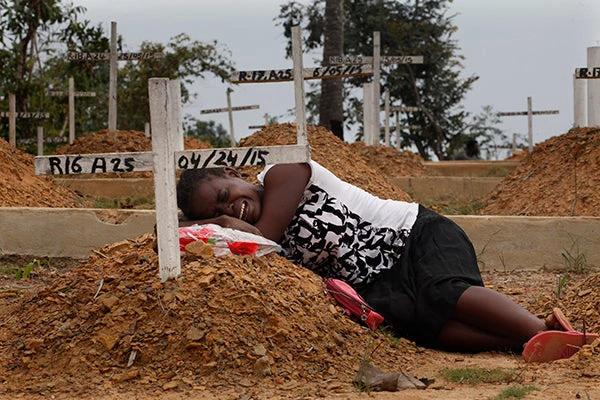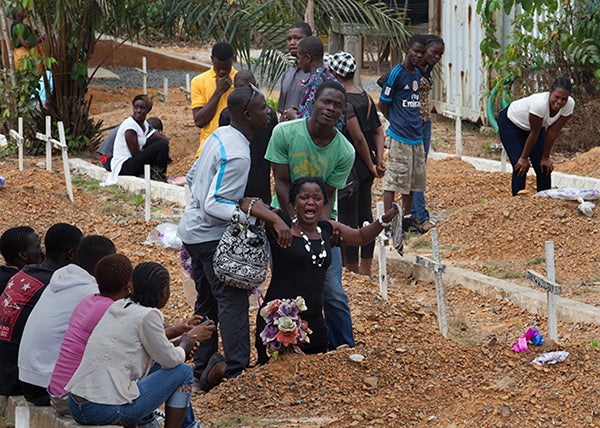
in Monrovia, Liberia on March 09, 2016. About 3600 suspected Ebola victims are buried
in Disco Hill Cemetery. Photo © Dominic Chavez/World Bank
Tears cascade down her face as she embraces the mound, her cheek pressed to the dirt, a body six feet below. She wails, screams, bends backward and then throws herself back on the grave, again and again. A wreath sheathed in plastic nestles below a simple cross marker with a name and a date: April 24, 2015 -- marking one of the 4,809 lives claimed by Ebola in Liberia.
Around her, dozens of families fan out in the cemetery, mourning the dead in a cacophony of prayers, cries and song, pleading with the dead to speak with them: "I want to talk to you. I call you and you can't answer," says one woman as she kneels at a grave, gripping the cross marker. About 3,600 people - all of them victims or suspected victims of Ebola - rest in perfect rows here at Disco Hill Cemetery. Some of the dead have names. Many lost their names when they arrived unconscious at the hospital, never to reawaken, no family willing to say they were theirs.
Today in Liberia, it's Decoration Day, an annual day when Liberians remember the dead. It's the first Decoration Day since Ebola left the country earlier this year. Here at Disco Hill Cemetery - where more Ebola victims rest than in any other place - many of the mourners blame their loved ones' deaths on mysterious or suspicious causes. Few say that Ebola took their mothers, fathers, sisters, brothers and children from them, wary of the stigma that Ebola carries, not only for survivors, but for the families of the dead.

in Monrovia, Liberia on March 09, 2016. About 3600 suspected Ebola victims are
buried in Disco Hill Cemetery. Photo © Dominic Chavez/World Bank
With a paintbrush dripping with black, Elijah, a 32-year-old burial team worker, blackens a number and letter that are embossed in concrete at the head of each grave. He's been burying people in this cemetery since the country opened it two years ago to bury the victims of Ebola. Each death meant covering himself from head to toe in protective gear in the blazing heat, digging a six-foot-deep hole by hand and then burying the dead. Sometimes he buried people he knew.
Today he's painting the grave of his 28-year-old niece, Comfort. "She left her children behind," he says. Since Comfort's death, he's been the only person to visit her grave. Most of the graves in the cemetery are without wreaths or visitors.
Burial workers had some of the riskiest jobs during the Ebola crisis. "There was no one to do the job. I gave myself to bury our brothers and sisters," Elijah says. He paid a huge price for his heroism. His mother kicked him out of the house, and his community and friends turned their backs on him, afraid that they'd get Ebola from him. After the Ebola crisis, his mother did welcome him back. He forgave her.
Not all Ebola victims were buried, however. Early in the crisis, some were cremated - although cremation is strictly discouraged in Liberian culture. The ashes of many Ebola victims are stored in drums in a small building at the cemetery. Josephine, 30, an Ebola survivor who lost her parents and other relatives to Ebola, isn't going to Disco Hill Cemetery today, even though it's a short distance from her house, and even though her parents' ashes are interred there. "If we go there, we will stand there and look at other people laying wreaths on graves," says Josephine. She said she won't mourn them until she can mourn them according to her culture.
Instead, others walk among the graves today. Chilling cries fill the air: "You were the only child," says a woman as she sits on the concrete footer of her child's grave.
Related
Blog: In a community ravaged by Ebola, signs of hope and continuing need
World Bank Group and Ebola Response
Follow the World Bank health team on Twitter: @WBG_Health


Join the Conversation